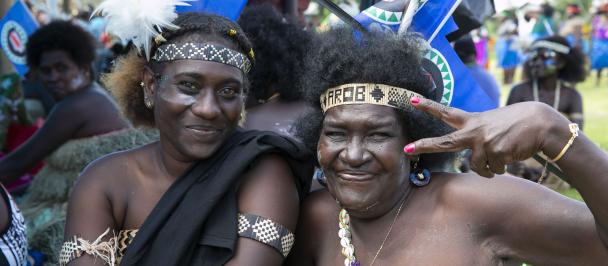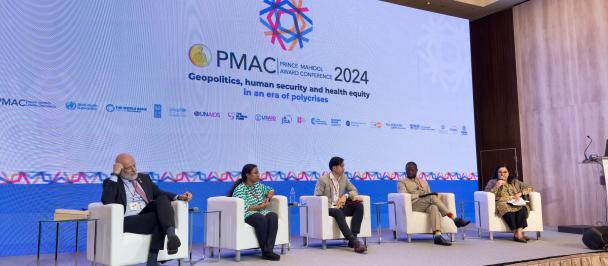The SDG Finance Collaborative offered an opportunity to bring together UNDP Country Offices from RBAP and beyond, the Bangkok Regional Hub, other Regional Bureaux as well as Global Policy Network and SDG Finance Sector Hub colleagues to share knowledge and build capacities.
Bangkok. May 1, 2019.
Finance experts from over 30 UNDP Country Offices, headquarters and multiple regional bureaux assembled in Bangkok this week for the SDG Finance Collaborative, looking at new ways governments can mobilize and manage financing for the Sustainable Development Goals, and measure the impact of their investments.
Working in plenary and parallel sessions, participants shared their experience on what governments have done so far to integrate financing streams and align budgets and national development plans to the Sustainable Development Goals.
By the end of the discussions in Bangkok, participants had a concrete articulation towards:
· A common vision and approach for Financing the SDGs
· An integrated set of services that scale up impact on Financing the SDGs at the country level
· Communities of Practice in different strategic areas for our engagements on Financing the SDGs
· Capacity development for UNDP staff on Financing the SDGs
· Next steps for the SDG Finance Collaborative moving forward
All across UNDP, country offices are working on different aspects of public and private finance for the SDGs, said Marcos Neto who heads UNDP’s Finance Sector Hub. “The Hub has been created to uncover this excellence and to help scale it up. The hub is developing a coherent framework and a series of coherent service offers to serve our government and businesses clients via country offices.
"UNDP needs to play a much more important role in leveraging private sector capital. We are the custodian of the goals and our vision is a world in which all capital flows advance the Global Goals, said Elizabeth Boggs-Davidsen, Director of SDG Impact at UNDP.
The Sustainable Development Goals (SDGs) came into effect in 2016 and reflect a systemic approach to sustainable development that embodies economic, social and environmental progress and leaves no one behind. Financing this agenda requires more integrated approaches to financing, where public and private sources of finance contribute to national development.
“We have taken steps to make sense of our financing portfolio so that instead of a collection of projects, we can co-create a comprehensive, holistic package of services to offer governments and partners,” said Valerie Cliff, Deputy Director for UNDP’s Asia-Pacific Bureau and Director of the Bangkok Regional Hub.
To support government and the private sector in scaling-up approaches to financing the SDGs, UNDP aims to offer an integrated package to assist governments in more comprehensively engaging with private and public partners and maximize the use of sources of development finance.
“UNDP has a diverse finance portfolio, and at the end of this workshop, we’ve converged on a common definition of the concept of SDG Financing across that portfolio and what role we can play when governments turn to us for support,” said Jaco Cilliers, Head of Regional Programmes at UNDP Asia-Pacific.
“We’ve also questioned whether we have the expertise and the internal culture we need in order to fill this role, and we’ve identified the gaps and are building internal capacity as well changing the way we work to better suit the needs of our client governments."
The decentralized nature of UNDP’s work provides a basis for innovation and provides an opportunity to build synergies and achieve scale.
With UNDP support, Bangladesh developed and SDG Financing Strategy and and provides strategic guidance about various public and private flows that can be mobilized to realize the objectives articulated in the vision. Bangladesh is also one of the first countries in the world to have estimated the costs of achieving the SDGs.
The SDG Finance Collaborative offered an opportunity to bring together UNDP Country Offices from RBAP and beyond, the Bangkok Regional Hub, other Regional Bureaux as well as Global Policy Network and SDG Finance Sector Hub colleagues to share knowledge and build capacities.
In addition to capacity development, the SDG Finance Collaborative will focus on strategizing and elaborating service offer areas. Two core questions for the group will be (i) how do we scale up our impact on Financing the SDGs; and (ii) how do we establish a business model that allows us to mobilise and spend resources to sustain our engagement. The Collaborative includes a parallel but linked set of capacity development sessions in Impact Measurement and Management (IMM) for pilot countries to the SDG Impact initiative.
--------------------------------
The SDG Finance work in Asia-Pacific is led by our SDG Finance Advisor Thomas Beloe.
For more info: www.sdgfin.org

 Locations
Locations



